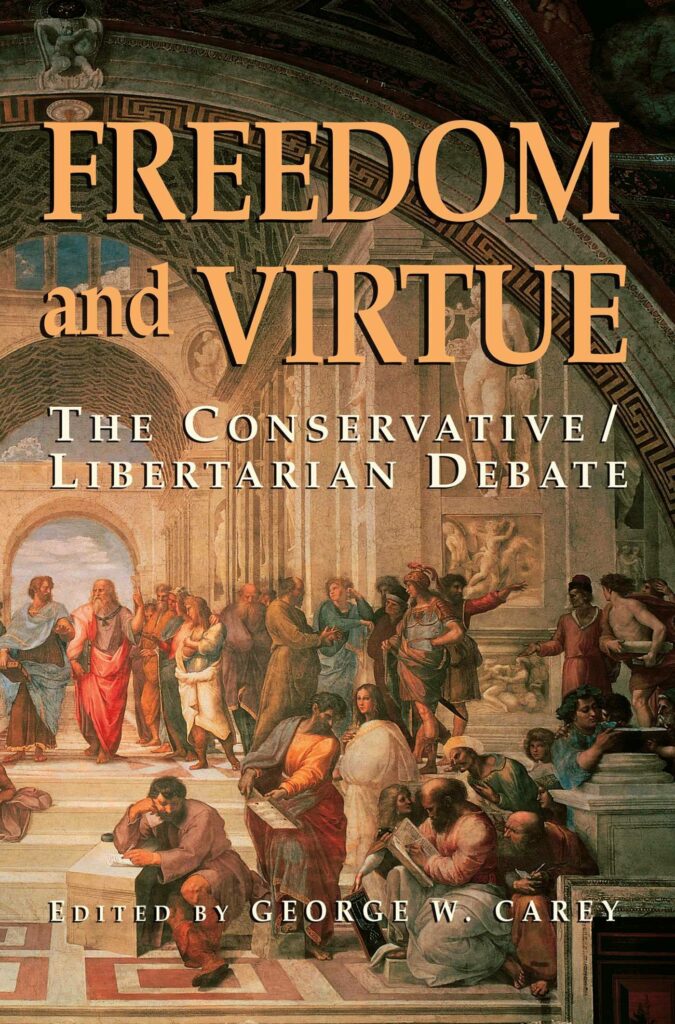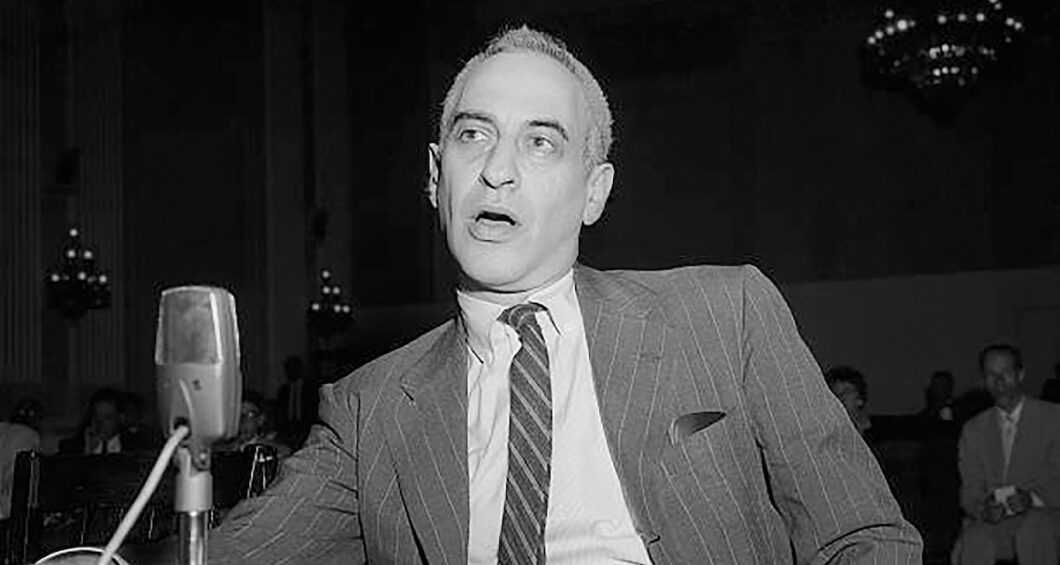Fusionism: The Only Game in Town
Editor’s Note: This is part of Law & Liberty‘s series of Faultline Essays, in which authors offer different perspectives on a given topic and respond to one another. Alexander Salter and Jeffrey Polet reflect on the relevance of the 1984 collection Freedom and Virtue for the current debate over conservatism and liberty.
Freedom or virtue? The debate over which comes first is perennial on the American right. In some ways, the rise of national conservatism and common good capitalism, with their attendant criticisms of classically liberal conservatism, echoes the traditionalist-libertarian arguments from decades ago. Revisiting those intellectual contests can help us make sense of ongoing controversies.
Freedom and Virtue: The Conservative/Libertarian Debate, edited by George W. Carey and published by the Intercollegiate Studies Institute, is a wonderful source for re-familiarizing ourselves with the essential issues. The seventeen contributors offer a range of perspectives on freedom and virtue. Each addresses, if only indirectly, the dispute over fusionism—the synthesis of order and liberty promoted by Frank Meyer and M. Stanton Evans (both contributors), and others adjacent to the early National Review crowd. “Is it possible,” George Carey asks in his Introduction, “to reconcile the libertarian concern for individual liberty with the conservatives’ preoccupation with order and virtue? Or are the differences so fundamental that the two schools can never be joined at a theoretical level?”

Gentlemen, start your engines. Proponents of fusionism argued then, and now, that political liberty is the foundation of a virtuous society. Critics of fusionism argued then, and now, that fusionism is philosophically incoherent and politically self-defeating because it denies the primacy of the common good. Things are just as rowdy and contentious today as they were in the 1950s.
Rereading the Freedom and Virtue essays reminded me just how difficult (and exhilarating!) are the philosophical problems that underlie the conservative-libertarian debate. It also convinced me that coming to a neat, rationalistic “solution” is unnecessary. Make no mistake: I side with the fusionists when it comes to a liberty-first approach to politics. But that is not because liberty ranks ahead of virtue in the abstract. To quote Stephen Tonsor, conservatives “must reconcile themselves to the dialectic of freedom and authority and must capitalize on the values of their divided heritage.” The dialectic is not a means to the answer; it is the answer. And our patrimony of ordered liberty, including the institutions within which we hash out these disagreements, bears witness to this. Fusionism just is the American tradition. It is as viable today as ever.
Meyer vs. Bozell
Any discussion of fusionism must begin with the Meyer-Bozell debate. Frank S. Meyer was a reformed Communist who became the primary intellectual architect of fusionism. Brent Bozell, his National Review colleague, was a traditionalist Catholic and the chief skeptic of a freedom-virtue synthesis.
Meyer championed “the common source in the ethos of Western civilization from which flow both the traditionalist and libertarian currents.” Man’s highest goal is the pursuit of the good, achieved through virtue: the ethical habits that predispose us to right action. Political liberty, which makes men “free from the constraint of the physical coercion of the unlimited state,” is necessary because it allows the “free choice of good over evil.” Government cannot make men good because compelled virtue is a contradiction in terms. Hence government power is necessarily limited by the “sacred sphere of the individual person.” Society exists to make men good, but the state, as society’s coercive apparatus, exists to make men free.
Bozell dissented. He was skeptical that “the choice necessary to virtue can be affected by external circumstances,” such as political coercion. Was not St. Paul supremely virtuous when persecuted by the Jewish religious authorities and the Roman state? “The freedom that is necessary to virtue is presumably the freedom no man will ever be without,” Bozell contended. The will is free to choose the best it can, political liberty or no.
Furthermore, “freedom is hardly a blessing,” since man is wounded by sin and apt to choose evil over good. “It follows that if individual man is to have any hope of conforming with his [God-given] nature, he needs all the help he can get.” A Christian commonwealth built “according to the divine patterns of order” is necessary to help us live as God intended.
Bozell leveled a famous reductio at Meyer: If virtue must be freely chosen—that is, willingly embraced absent external constraint—does it not follow that society should remove any and all impediments to vice? After all, with fewer social guardrails, the choice of virtue becomes more praiseworthy. Vice should be made as easy as possible (and perhaps even encouraged) so that men could virtuously overcome the temptation.
Meyer did not point it out, but a similar reductio could be leveled at Bozell. Surely our highest good is communion with God in His Kingdom, and there is no surer path there than martyrdom. Hence the state, to promote man’s ultimate end, should persecute Christians. Those that persevere obtain beatitude; those who fall away have the chance to repent. After all, the martyrologies of the Church are filled with tales of saints who initially apostatized but ended their lives witnessing Christ.
Logical consistency is obviously important, but these syllogistic squabbles will not settle the issue. It comes down to this: Can the state, through its police powers, promote ethical habits by taking bad options off the table? While conceptually possible, I do not see why this is at all likely. If anything, we will get the opposite: A domineering state that coerces citizens “for their own good” is likely to instill contempt for the law and indifference towards the commonwealth.
An obvious American example is alcohol prohibition. While it’s likely the 18th Amendment lowered total consumption, it also created a culture of legal circumvention. New and highly profitable criminal enterprises flourished. The “bootleggers and Baptists” alliance of illicit enterprises and pietistic Protestants was viewed by the majority of the country, especially High-Church Protestants and Catholics, as petty busybodies. (Of course, anti-fusionists would argue this law was not virtuous, unlike the ones they want to force on the body politic. “I’ll take question-begging for $400, Alex!”)
The cultural critique leveled by traditionalist conservatives makes Meyer’s position stronger, not weaker. Certainly there has been major cultural degradation since the first fusionism debates in the 1950s. Much of that has happened with the blessing, if not the active participation, of the state. If government power could be trusted to make men good, why did the massive growth of government coincide with the erosion of public virtue? Where will we find our cadre of political paladins to take the reins of government and guide us to goodness? And should we empower them, what about their virtue? Surely we must worry about the magistrates who, if forced to choose between charity and duty, may corrupt their own souls by threatening and inflicting violence on their countrymen.
Nobody would accuse St. Augustine or St. Thomas Aquinas of laxity. Yet even they believed in a tightly restricted domain of political coercion, preferring even sins like prostitution to remain legal. “If you expel prostitution from society, you will unsettle everything on account of lusts,” Augustine warned. Aquinas cites Augustine in his own recommendation of tolerance. They were not, to be clear, libertarians—not by a long shot. But they recognized that the attempt to make men good by law would inadvertently harm the common good by creating a more sinful society. We cannot trust the prudence of the magistrate to determine the morally acceptable bounds of institutionalized violence, as Bozell prefers. One statesman’s prudent restraint is another’s timorous inaction.
Liberty is the first principle of politics because mankind has learned, through a long process of trial and error, that the comparative advantage of the state is keeping the peace. This does not mean valuing freedom more than virtue. It does mean allocating to social spheres those tasks at which they are most competent. Furthermore, if we believe man is made in the image of God, we must recognize there are certain things we may not do to him, even for his own good. Our Christian duty expresses itself, first and foremost, in persuasion and example—and failing that, the discipline of the ecclesiastical, not the civil, hierarchy.
The Patrimony of Christendom
Conservative liberty-skeptics denigrate fusionism as a mere coalitional strategy: a rickety ideological structure for housing libertarians, traditionalists, and foreign policy hawks under the same political roof. This is a mistake. Meyer and his compatriots made a serious contribution to political and social philosophy—but not by innovating, or by bringing together otherwise disparate groups. Instead, the fusionists gave intellectual expression to an already-existing synthesis of freedom and virtue. They sought to explain a tradition, not create one de novo.
M. Stanton Evans’s contribution to the volume illustrates this beautifully. He argues that “individual liberty, limited government, representative institutions and the scientific attainments of the West are the products of Biblical theism generally, and of the Christian Middle Ages in particular.” Christian theology taught us the individual person, not the state, is sacred. Covenant, constitutionalism, and contract all owe their lofty status to medieval Christian thought and institutions.
These ideas took root in America. We do not need to speculate about the relationship between covenantal theology and the social contract—we have an explicit affirmative link in the form of the Mayflower Compact. Later developments, including a “bicameral legislature,” “checks-and-balances principles,” and even “a precursor to the Bill of Rights” all stemmed from the Christian tradition of liberty. “In these developments,” Evans continues, “we find the embryo of virtually all the political institutions which were embodied in the constitutions of the several states, and were transferred thence into the Constitution of the new American Republic.” America’s religious, social, and political patrimony testifies that “our tradition is a tradition of freedom, and our libertarian precepts are undergirded by the traditional values of our faith.”
Federalism merits special attention as a constitutional attribute. Evans highlights colonial New England’s “strong emphasis on local town government,” but the other colonies had their own institutions that reflected a widespread preference for the local and particular. Even the Constitution, which greatly strengthened the national government, does not claim to legitimize the states; rather it recognizes them as prior political entities with their own rights and jurisdictions. Whereas dividing the branches of government creates a horizontal check on power, federalism creates a vertical check on power. It constrains the predatory prospects of politics while unleashing its protective and productive prospects.
Our Constitutional architecture thus allows for a political virtue gradient: The national government focuses on freedom, whereas state and local governments take the responsibility for more substantive goods, to the extent citizens demand them. The closer the citizen is to his government, the more he can go in for a politics of virtue. Exit, voice, and loyalty become complementary mechanisms to make government increasingly consensual without sacrificing the common good.
Evans’s historical perspective reminds us that freedom and virtue are a precious inheritance. They inevitably give rise to tensions. America’s institutions help us navigate those tensions in the quest for ordered liberty. Formal constitutions, representative democracy, the rule of law, and private property rights are the means by which we evaluate the tradeoffs that arise because of our dual commitment to living free and living well.
Against Political Autopilot
Ordered liberty in America still depends on a broadly liberty-centric political ethic and a broadly virtue-centric social ethic. Given our traditions, there’s no other game in town. It’s fusionism or nothing. The new proclivity for tradition-oriented conservatives to embrace “post-liberalism” should be viewed as an attempt to stage a second Founding on principles very different from those bequeathed to us.
There are good reasons for conservatives to renew their political commitments to liberty. The objection that fusionism’s “dead consensus” is inadequate to the challenges of our time is unfounded. Supposedly the hegemony of Progressivism, not just in the administrative state but also corporations, the media, universities, and nonprofits, reveals the failures of classically-liberal conservatism. Not so! Classically liberal conservatives are right to emphasize limited government, for without political power, Progressivism-run-amok would tumble down like a house of cards.
Political liberty gives us the freedom to do as we ought, and communal virtue habituates us to the good. Fusionism remains indispensable for liberty under law in America. We must not give up on it.
What is often called “woke capitalism” is simply a manifestation of Progressivism in a newly contested sphere. Progressivism is really a distributed institutional network, a spontaneous order with power itself as the organizing principle. Post-liberal conservatives think the fusionist project is doomed because each time we cut a head off the hydra, two more sprout. But this isn’t the right metaphor. Progressivism is a sturdy arch, but political power—the state itself—is the keystone. Without the institutionalized force to reward friends, punish enemies, steer public resources, and maintain patronage relationships, the network would atrophy. Crony wokism is not the natural manifestation of liberal-democratic capitalism; it’s the deformed offshoot of politicized corporations and corporatized politics, buttressed by the unconstrained state.
This isn’t to say fusionism has an unassailable track record. There are many political battles earlier conservatives should have fought but did not. And among some fusionists there is too strong a faith in the power of a supposedly self-enforcing Constitution. Just get the rules and procedures right, the thinking goes, and politics will take care of itself. Clearly this is wrong. But ironically, anti-fusionists make the same mistake. Their faith in getting the elites right rather than the procedures right is equally misplaced. In reality, classical liberals and post-liberals can be guilty of trying to reduce politics to an algorithm. Alas, the ship of state has no autopilot.
Contemporary Challenges
What does this mean for the conservative-libertarian debate today? My interlocutor, Jeff Polet, makes many good points in his essay. We agree that left-Progressive dominance of key political, cultural, and commercial institutions threatens ordered liberty. We also agree that a richer value system than libertarianism alone is necessary to preserve a free society. Mr. Polet looks for a “new kind of fusionism,” one that retains the “fundamental impulse of the libertarian to resist all coercion” while remaining faithful to the permanent things.
However, I think Mr. Polet sometimes misses the mark. He is too quick to assert a positive role for government on communitarian grounds. Contrary to popular perception, the politics of liberty does not imply social individualism. Many libertarian-conservatives recognize the importance of community and intermediary institutions, not only because of their instrumental value in constraining state power, but also because of their formative character. But we must not view government this way, especially given the current cultural landscape. Remember: There has been no greater malign innovator and destroyer of community than the state. A self-governing republic certainly “has an interest in the formation of good citizens.” That is why our coercive institutions should focus on protecting rights, so we can build and engage in authentic community from the ground-up.
The best part of Mr. Polet’s essay is his nuanced perspective on virtue formation. By my count, he devotes half of the article to exploring the fundamentals of virtue, describing how it is inculcated, and relating its importance for our constitutional system. But given how complex and intricate this process is, why on earth would we expect Washington, DC to foster it? Indeed, Mr. Polet’s emphasis on the role of government sits in tension with his opening recognition of left-Progressive institutional dominance. These are the people who would be wielding state power to shape the character of our children. There is no avoiding the tragic reality that when we empower the government to enforce virtue, we build for the enemy the weapons he will use against us. We demand the state to protect us from impiety and are shocked when, in our name, it condemns Socrates to death.
Mr. Polet would no doubt reply that wishing cannot change the basic social fact that the law is a teacher. Perhaps so. But then it is even more curious that his learned essay does not address the institutional compromises embedded in the American system. Although he occasionally refers to the maintenance of constitutional norms, he should have discussed federalism much more extensively. Fusionism already recognizes that citizens demand a substantive vision of the good in public life. That is why most governing should occur at the most local level possible. If my town or state governments becomes hostile to the true, the good, and the beautiful, I have many options. If my national government becomes hostile, I have few.
Conclusion
On reading Carey’s volume, Mr. Polet was “impressed with how much overlap there is between the libertarian and conservative positions.” I believe this is correct, provided both positions are self-consciously embedded in the American constitutional tradition. But this brings us back to old-school fusionism, with its liberty-first approach to politics. In this tradition, “respect for the individual person” necessarily implies the right to do (some) wrongs. We do need rules for “weighing carefully the harm caused by restricting the right to choose against that caused by allowing people to choose badly.” We do not need, nor should we want, those rules enforced at gunpoint.
We end, as is proper, with a bedrock principle: the inviolable dignity of the human person. My choice of “person” instead of “individual” is deliberate. Personhood is relational. “I” and “thou” are reciprocally endowed with meaning and structured by the communities that shape us. But what kinds of communities help us live according to the ordo amoris? Political liberty gives us the freedom to do as we ought, and communal virtue habituates us to the good. Fusionism remains indispensable for liberty under law in America. We must not give up on it.



